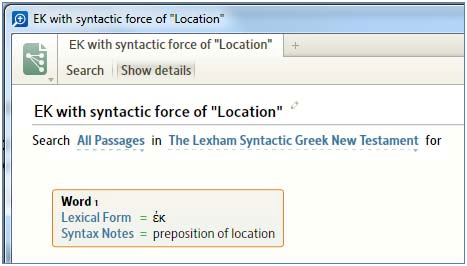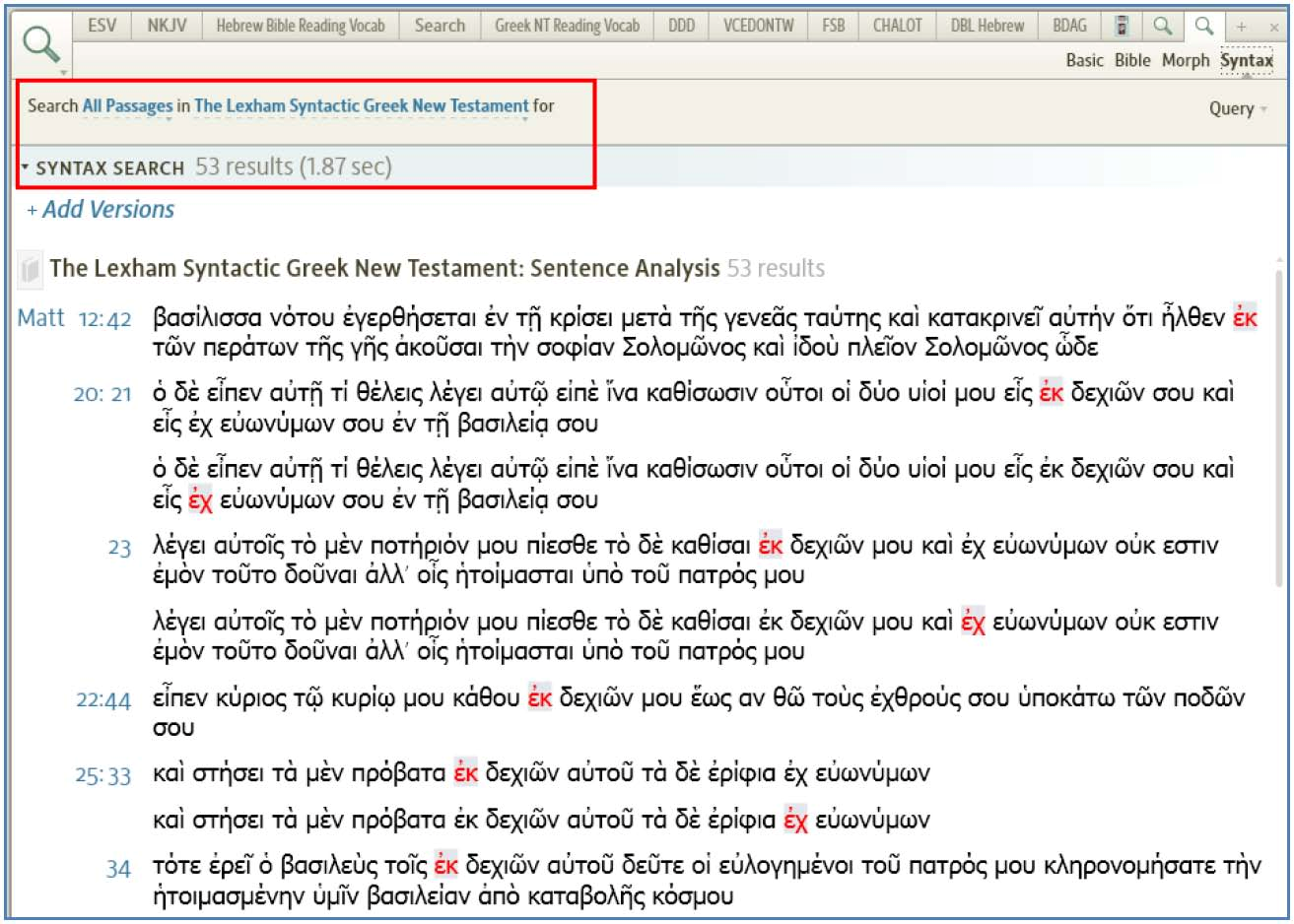A couple months ago a friend sent me a link to a New Testament study that was apparently being popularized within certain segments of the Church to legitimize abortion. The argument is patently illogical, but that isn’t why I’m blogging about it. There’s more to it than just poor thinking. Here we go.
Luke 1:13-15 reads as follows in the ESV:
13 But the angel said to him, Do not be afraid, Zechariah, for your prayer has been heard, and your wife Elizabeth will bear you a son, and you shall call his name John. 14 And you will have joy and gladness, and many will rejoice at his birth, 15 for he will be great before the Lord. And he must not drink wine or strong drink, and he will be filled with the Holy Spirit, even from his mothers womb.
Verse 15 is the focus in the argument. The idea is that since John the Baptist was filled with the Holy Spirit from (Greek: ek) his mother’s womb, he only became an actual person when he was born. The “study” connected this language about the Holy Spirit to the breath of life of the first man (Gen 2:7) in arguing this conclusion, and so the thinking was that the birth event evidenced a genuine human life, since birth was the first time the fetus drew breath (or something like that). Now, the logical and theological problems are painfully obvious. To list a few:
1. Why would we presume (biblical, logically, or medically) that every successive human being after Adam received the Holy Spirit when breathing for the first time?
2. Why would we presume that the fetus wasn’t breathing before (i.e., drawing oxygen, which a fetus does do in the womb)?
3. Why would we not conclude, then, that every human born has the Holy Spirit? (I wonder what we get at regeneration then)
It’s easy to pick on; I’ll grant that. But a lot of the discussion focused on the Greek preposition ek (“from”) in Luke 1:15. The author made a big deal that the Holy Spirit (and hence life, and hence human personhood, in this feeble logic trajectory) was only “actual” when the baby left the womb. The preposition nailed things down for the writer. In defense of his view, he quoted the notable modern Greek grammarian Dan Wallace.1 Wallace lists the semantic options for ek as follows:
A. Basic Uses (with Genitive only)In general, has the force of from, out of, away from, of.1. Source: out of, from2. Separation: away from, from3. Temporal: from, from [this point] on4. Cause: because of5. Partitive (i.e., substituting for a partitive gen.): of6. Means: by, from
The writer then made the point that ek did not denote a position within the womb or with the mother — but only “out of” or “away from” the mother. And so the fetus only became a human soul/person/recipient of the Spirit once born and “out of” or “away from” the mother.
I want to put aside the numerous ways this interpretation could be demolished and focus on the syntactical force of the preposition ek. There are two approaches we could take in response.
First, it seems this “teacher” presumed Wallace was inspired and didn’t bother to look up the preposition in another reference grammar. For example, A. T. Robertson’s massive reference grammar lists nine possible meanings for the preposition, including place (“The preposition naturally is common with expressions of place. The strict idea of from within is common…”) and origin or source (“Equally obvious seems the use of ek for the idea of origin or source”).2 While the idea of “separation” is of course among Robertson’s options, and would not doubt be favored by our Christian pro-abortion theorist, these options would could easily be referenced, complete with examples, in Robertson’s famous grammar. Wallace is hardly exhaustive (and never pretends to be).
We could reference other grammars to produce the same material, but it’s the second approach that few people would consider that turns out to be even more useful: The Lexham Syntactic Greek New Testament (LSGNT) created by Logos Bible Software through the work of Drs. Albert Lukaszewski, Ted Blakley, and Mark Dubis.
The LSGNT is a database wherein every word of the Greek NT is tagged for its syntactic force in context. It took years of work, primarily by Dr. Lukaszewski, and it’s the perfect tool for something like this issue. I used this tool to answer my friend’s question in regard to the coherence of the view described above. I’ll summarize here.
First, the claim was that the Greek preposition ek not only means out of, from in Luke 1:15, thereby denoting that the child only had the Holy Spirit (and so, personhood in this logic) once he had exited the womb. Therefore, the child didn’t have the Spirit (and is not a person) while in the womb.
To overturn the claim we would need clear examples where ek indeed does denote location.” Put another way, we would need to find instances where the preposition does not speak of distance from the noun it governs (in Luke 1:15, that would be the womb), but rather at or in the noun it governs. If we find instances of this usage, the claim is undermined (and then the rules of logic can beat the snot out of it).
In the LSGNT the search would look like this:

Here’s a screenshot of the results returned by the search (note that ex, epsilon-chi is included as well):

So, according to the scholars who produced the LSGNT, ek/ex has the syntactical force of location 53 times. The next step is naturally to look up the occurrences. A number of them are instances where Jesus is “at (ek) the right hand of God,” for example, which clearly intends to suggest nearness, not distance.
It is telling that Luke 1:15 is in the list of results (not shown in the screen capture). The scholars who created this database saw the preposition ek in that verse as denoting location. We would not choose at or on for the translation, since either defies common sense that is, you cannot describe location with respect to a womans womb with at or on precisely because a womans womb is inside her body. Hence the best way to translate ek here would be with in to denote location. The certainty of this translation is secured by something the our pro-abortion theorist forgot (or never saw): the adverb eti (“still, yet”) immediately preceding the prepositional phrase. The whole phrase, then, is “yet/still in his mother’s womb.” Let me suggest that it makes zero sense to have John the Baptist having the Holy Spirit while still outside his mother’s womb. I’m just saying.
Even more interesting is Acts 14:8, also in the LSGNT result list. It is a word-for-word parallel (minus eti) to Luke 1:15 – “from (ek) his mother’s womb.” The verse in context reads as follows:
8 Now at Lystra there was a man sitting who could not use his feet. He was crippled from birth and had never walked.
Now here is the question: Can we really conclude that this man was only crippled after he had been born? Did the doctor or the midwife drop him? Did he pop out prematurely and hit the ground, incurring a paralyzing injury? I would suggest that his crippling condition could just as well have been congenital, incurred while in (ek) the womb of his mother. It would seem that a congenital condition is actually what is in mind in view of the negative adverb in the description, oudepote, which BDAG defines, “an indefinite negated point of time, never.”3 But I have no reason to believe that the author of the material promoting Luke 1:15 and the preposition ek as support for abortion ever even thought about analyzing all the occurrences of the preposition this way. It’s simply another case of cherry-picking a grammar (usually it’s a lexicon) to “prove” whatever point it is that one favors. Not only is it an exegetical fallacy; it’s an exegetical travesty (sounds like a good book title).
- Daniel B. Wallace, Greek Grammar Beyond the Basics – Exegetical Syntax of the New Testament (Zondervan Publishing House and Galaxie Software, 1999; 2002), 371. ↩
- A.T. Robertson, A Grammar of the Greek New Testament in the Light of Historical Research (Logos, 1919; 2006), 597-598. ↩
- William Arndt et al., A Greek-English Lexicon of the New Testament and Other Early Christian Literature (3rd ed.; Chicago: University of Chicago Press, 2000), 735. ↩





That reading was almost as lame as Jesus supporting lesbianism because of the two women ‘grinding’ at his return…
What do they do with Luke 1:41, 44?
By “they” do you mean the syntactical database trio?
I see this quite a lot, a resourceful Bible student will look up a certain word and see all the possible meanings in the lexicon and will then proceed to tell people the verse means this or that because of the meaning of the word “can” mean this.
I first heard you say this but now i have seen it for myself…. logic is very important for competent bible study. Its tragic that people are serious enough to go look up words and do Bible studies but dont have the mental tools to come to a decent conclusion. Of course some people have agendas quite clearly but i see this with well meaning people also. It seems a lexicon and poor logic is a deadly combination.